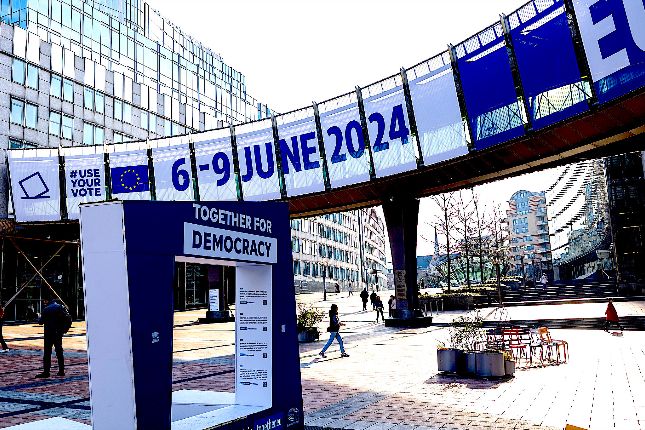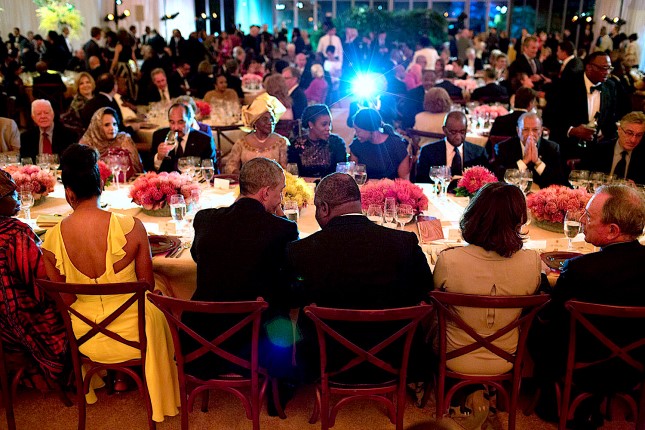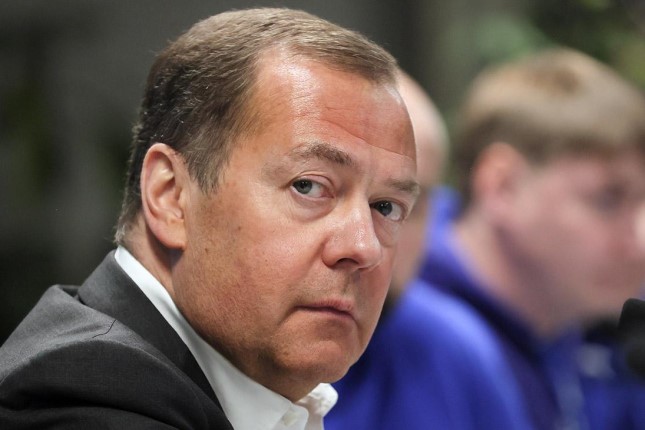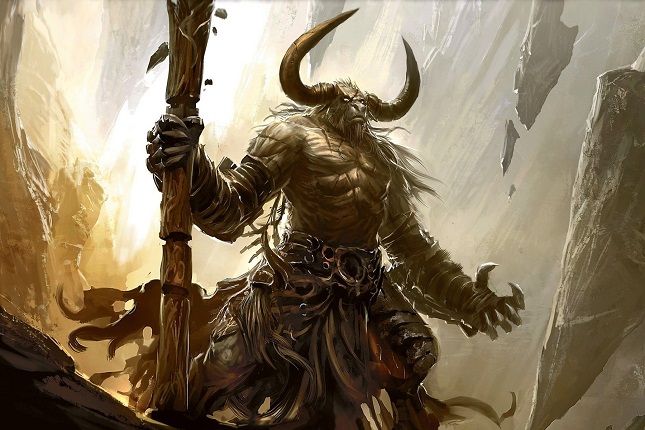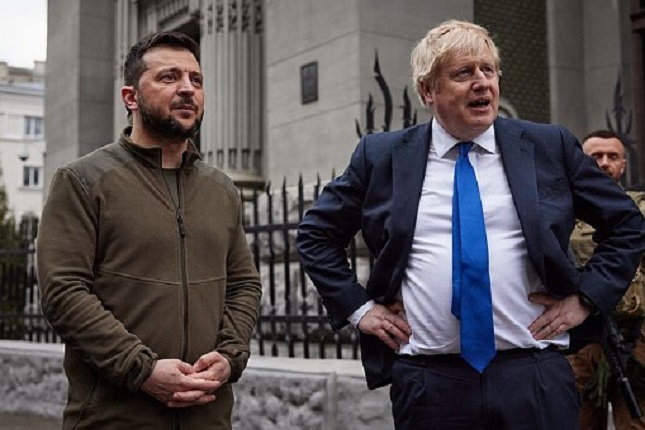Ah, those elections last week to the European Parliament, in which voters across the European Union administered a sound whack to the technocrats, market fundamentalists and liberal authoritarians who now hold power across much of the Continent: Let us attempt what we are not supposed ever to undertake. Let us try to understand them.
The E.U. Parliament, to get straight a few basic details, is one strut of the three-legged stool of which the union is made: The unelected technocrats are in Brussels, the unelected central bankers are in Frankfurt and the elected legislature is in Strasbourg. Belgium, Germany and France: The distribution of institutional power in this way is meant as a display of the Continent’s hard-won unity.
The catch here, and the reason I and many others got off the E.U. bus years ago, is that the lawmakers in Strasbourg are essentially powerless. Yes, you had inspired MEPs such as Claire Daly and her colleague Mick Wallace, both Irish (and you have to love Daly’s lilting brogue).
They made use of the legislative chambers in Strasbourg to articulate principled positions on Gaza, Ukraine and other such questions, but there has never been any question of the E.U. Parliament having the power to legislate the union’s direction. Parenthetically, Daly and Wallace were voted out of office in last week’s elections.
The E.U. is as it has long been — an undemocratic institution atop which sit neoliberal ideologues and austerian central bankers, technocrats who take no interest in the democratic process or the wishes of the E.U.’s citizenry.
Readers may recall the brutality with which Brussels and Frankfurt had Athenians eating out of garbage cans nine years ago to protect the interests of bond investors holding Greek sovereign debt. That was the E.U. in action, the E.U. that has perverted the worthy vision of its postwar founders.
When we look at the polls held June 6–9 across the Continent, we must recognize a certain paradox.
The MEPs elected will have little power, as European voters know better than anyone, but it was precisely to protest the corruption of European democracy that these voters delivered so severe a blow to mainstream parties and the Brussels technocrats from whom they are virtually inseparable.
The outstanding question in the European capitals now is whether the profound animosity evident in last week’s election results will carry over to national polls due in political seasons to come.
Figures such as Emmanuel Macron think that in legislative contests that will have actual consequences, unhappy voters will pull back from the brink: The E.U. vote as an acting out, let’s call this reasoning. I am not sure the French president is right about this.
The conditions that produced last week’s E.U.–wide results are clearly leading to a substantial migration away from the “center” liberal authoritarians speak of as some kind of sacred space.
A few numbers are in order. They measure a very considerable shift in European political sentiment toward parties commonly called “far-right” and various other descriptives in this line. These following are French and German results; the pattern elsewhere in the E.U. generally followed that in what we call Core Europe.
Macron’s Renaissance party is but eight years old and already looks like little more than a small club of neoliberals with backgrounds, like Macron’s, in banking, finance, private equity and other such fields.
It competed last week with a small coalition of inconsequential partners under the name Besoin d’Europe, “We need Europe,” roughly, and got 15.2 percent of the French vote — a loss just short of a third from the 2019 results. Put this against those of the Rassemblement National, National Rally, Marine Le Pen’s party.
It took 31.37 percent of the vote, a gain of more than a third since the last E.U. elections five years ago. In the E.U. context, Rassemblement is now France’s No. 1 party by a margin of more than 100 percent.
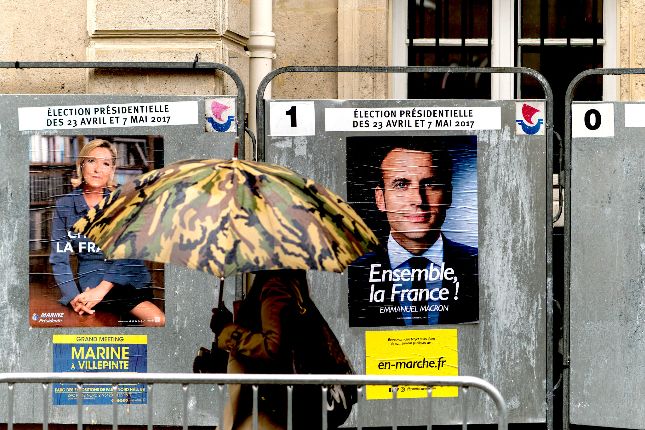
Le Pen and Macron — French election posters in Paris, 2017. Photo: Lorie Shaull / Flickr / CC BY 2.0.
A similar power shift occurred in the German vote. I could not be more pleased that the Greens, who lost their way long ago and are now a party of neoliberal warmongers, lost not quite three-quarters of their support, finishing with 11.9 percent of the vote.
The governing Social Democrats lost by less but won only 14 percent of the German vote. Now to the AfD, Alternative für Deutschland. It went home with 15.8 percent of the vote, an increase of roughly 44 percent. It is now Germany’s No. 2 party in the E.U. context.
Occupants of the “center” are in nothing short of a freakout, of course. Macron immediately dissolved the National Assembly, the legislature’s lower house, which is the French president’s constitutional prerogative.
“After this day, I cannot go on as though nothing has happened,” he declared in a national address. It is likely he will, in my read: He always does when faced with challenges of this kind — the “yellow vests” movement of 2018, for example. But the French leader’s panic is evident and shared among the other big losers in Europe’s neoliberal elites.
Canada may have nothing to do with E.U. elections, but Justin Trudeau said something exceedingly revealing of mainstream thinking (or not thinking) at the opening of the Group of 7 summit in Italy on June 13.
“We have seen around the world a rise of populist right-wing forces in just about every democracy,” the Canadian prime minister asserted. “It is of concern to see political parties choosing to instrumentalize anger, fear, division, anxiety.”
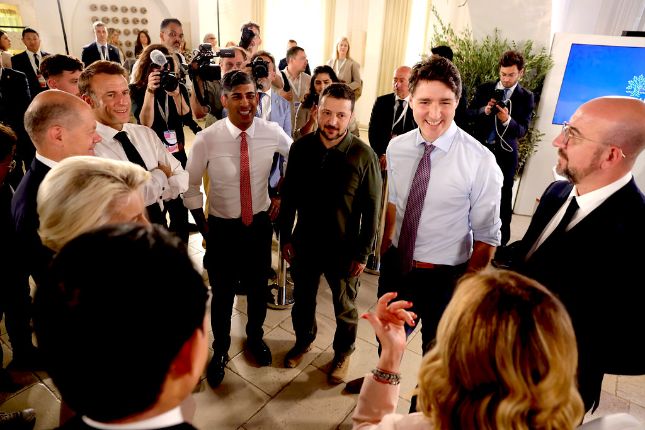
Trudeau at right during the G-7 in Apulia, Italy, June 13. Photo: Simon Dawson / No 10 Downing Street.
This beyond-belief-stupid utterance warrants consideration. Not only does it reflect the base refusal of incumbent European leaders to come to terms with their extensive failures to serve their citizens; it is also a neat encapsulation of exactly the same political dynamic abroad among America’s liberal elites.
Europeans ’R’ Us in this confrontation between those who abuse the power they hold and those who detest them for this.
The AfD, the National Rally, and similar parties beyond Core Europe: Americans ought to listen carefully and warily to the constant dismissals of European leaders.
They are not so crude as to call the ever-more present supporters of these parties “a basket of deplorables,” in Hillary Clinton’s memorable phrase, but if we consider what is said in Europe now we stand to hear what is being said in America more clearly.
We’ve been reading for months of Europe’s rising “far right,” “extreme right,” “hard right,” “right wing,” “nationalists” — all this with the occasional suggestion of neo–Nazi tendencies among these opposition parties. They are all guilty of that most unforgivable of sins: They are populists.
In reporting the election results last Thursday, The New York Times warned that “the far right” will now “wreak havoc.” My favorite in this line comes from a Paris correspondent who contributes occasional opinion pieces to the Times.
Commenting on France’s imminent snap elections — two rounds to be completed July 7 — Cole Stengler, who has written some very fine things in the past, advised the Times’ readers, “France is on the brink of something terrifying.”
Terrifying to whom? It is a good question even if nobody pauses to ask it. Terrifying, it seems, to the elites in European capitals and, of course, the media serving them. As to those who won in last week’s elections, they do not have names or faces. Labels will do, “terrifying” now added to them.
And their parties do not have platforms: They are merely “instrumentalizing” all that is on Trudeau’s list: People may be angry, fearful, anxious and stand against us, but how dare these cunning bastards running opposition parties give voters vehicles to express these things in polling booths?
I have from the first found all the hyperbolic nonsense deployed against Donald Trump — a dictator, a tyrant, a fascist who will end elections — transparent cry-wolf attempts to frighten those strange Americans who insist there is a point to voting.
It is also profoundly destructive of America’s political discourse. And lately I have come to listen to all the liberal authoritarians’ descriptives of Europe’s right-wing parties in the same way. Join me to consider a few matters in this connection.
Greater national sovereignty in reply to the high-handed arrogance of unelected technocrats and market-worshippers in Brussels and Frankfurt, an independent Europe that rejects its leaders’ subservience to Washington, peaceable relations with Russia and an end to the economically ruinous sanctions regime the U.S. has forced on Europe, an end, also, to financial, material, and political support for the thieving, neo–Nazi regime in Kiev and the proxy war waged at great human cost.
These are among the major positions of the parties that just gained in the E.U. elections. Tell me, please, what is “far-right” or inducing of “havoc” in any of this?
There is the immigration question. The victors in last week’s polls, notably the AfD, are famously opposed to continued immigration from North Africa and the Middle East. And yes, its platform includes support for some very harsh measures.
Think about this: the AfD is strongest in the states that previously belonged to the German Democratic Republic, weakest in the affluent states of western (lower-case “w”) Germany. And it is the old GDR states, which tend to be working class in character, that must absorb the highest concentrations of immigrants.
My question: Is it useful to dismiss AfD voters as racists, or would it be more politically responsible to address the immigration problem without the epithets?
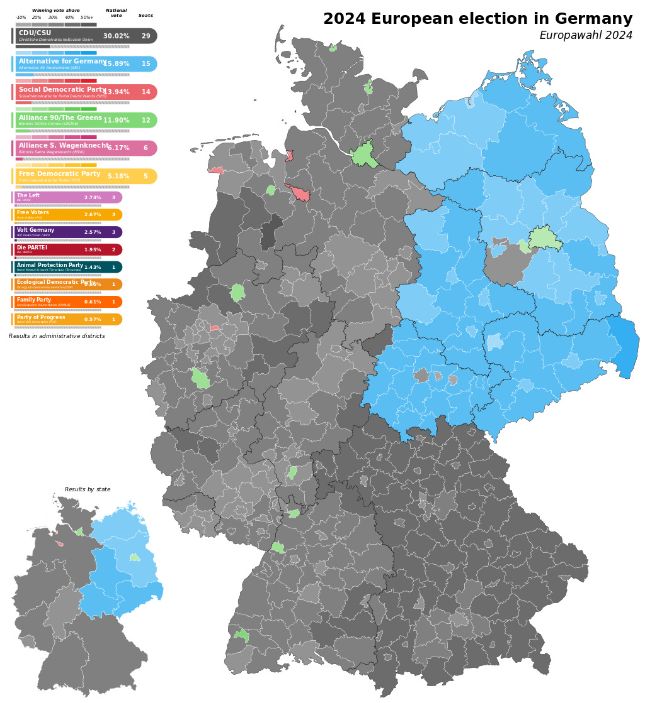
AfD shown in blue in the 2024 European Parliament election in Germany. Photo: Erinthecute, Wikimedia Commons / CC BY-SA 4.0.
I have been following the reporting of Erika Solomon, a correspondent in the Times’ Berlin bureau, with some care since last spring. Our Erika is very long on the AfD’s “extremists” — 10,000 of them by the German intelligence count — the party’s plots to overthrow the government, the Nazi-inflected utterances of this or that party figure (“Everything for Germany”), the covert ties to Russia.
You can read some of this stuff here, here and here. What I love about Erika Solomon’s files is that there is rarely anything in them. It is all innuendo, implication, suggestion, suspicion — and let us not forget hyperbole and misinterpretation. This is quite useful as one assesses the veracity of the liberal authoritarians’ incessant shrieks to the effect the AfD threatens the second coming of the Reich and so the end of German democracy.
I lost interest long ago in distinctions such as “left” and “right.” For one thing, unless you count people such as Michelle Goldberg — please don’t make me — there is no left left in the U.S., which presents a rhetorical problem right off the bat.
For another, if you put everyone in a box with a label on it you miss out on things. I favored a new détente with the Russians, withdrawing from Syria and Iraq, reassessing NATO — all positions Trump favored until those around him covertly foiled him.
It is the same with Europe’s far-right parties on this or that question. Neither Trump nor the rightest parties of Europe is my cuppa. But the truth in our time is often neither left nor right. It is simply true with no ideological imperative attaching to it.
In this connection, something interesting got underway among the French immediately after the E.U. return came in. In its June 11 editions, Le Monde reported that after hastily arranged marathon talks the various parties of the French left agreed to form un nouveau front populaire, a new popular front, to field common candidates in the legislative elections Macron declared two days earlier.
The intent is to combine “all the forces of the humanist left, trade unions, associations and citizens,” as Manuel Bompard, a leader of La France Insoumise, France Unbowed, Jean–Luc Mélenchon’s party, declared Thursday. And from Olivier Faure, first secretary of the Socialist Party: “A page of French history has been written.”
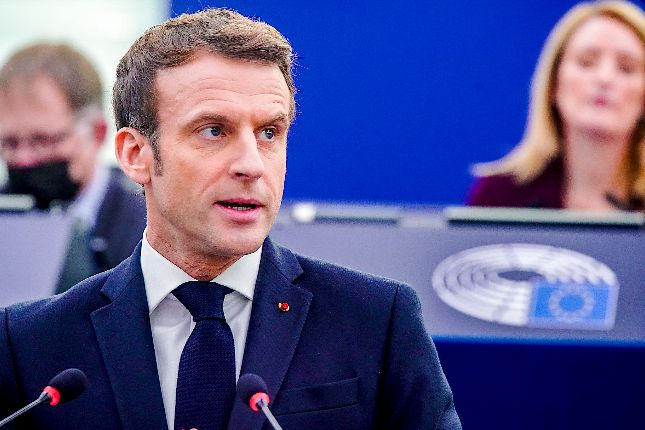
Macron addressing EU Parliament in 2022. Photo: European Parliament / Flickr / CC BY 2.0.
The French left tried this once before as the awkward sounding New Popular Ecological and Social Union, which collapsed late last year after a short, unhappy life. But this new alliance, news of which was instantly all over French media, seems more ambitious, serious and interesting.
It brings together all the main left parties — the Socialists, the Greens, Mélenchon’s France Unbowed and the good old Parti Communiste Français. Getting French Socialists and Communists to stand on the same platform is an accomplishment in itself.
They did it during the famed Popular Front of the 1930s, let us not forget. Maybe the referenced name suggests the parties involved see our moment as comparably grave.
I am not seeing much yet as to the planks in said platform. What will be the position on — the obvious big ones — Israel, Russia (on this the PCF’s presence is intriguing), Ukraine, European independence, immigration? Not yet clear.
But the political charge deriving from the E.U. elections and Macron’s risk of snap elections suggests the left in a major European nation sees an opening. In the best outcome, sound positions on the questions just noted will come from somewhere other than the energized right end of Europe’s political garden.
Main photo: Banners for the 2024 European elections campaign on the Agora Simone Veil of the European Parliament in Brussels in January 2024 © European Parliament / Flickr / CC BY 2.0.
Source: Consortium News.
